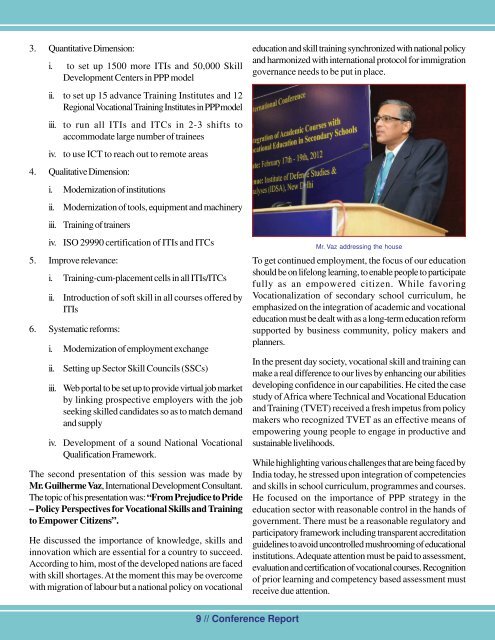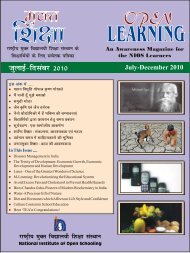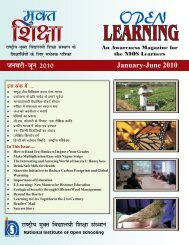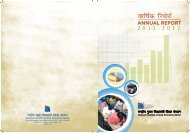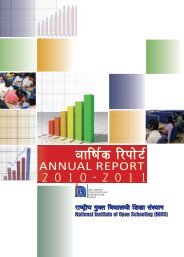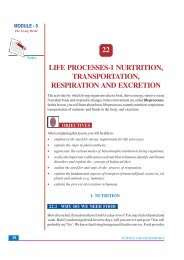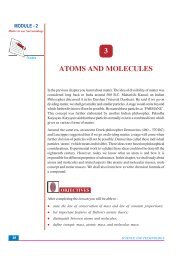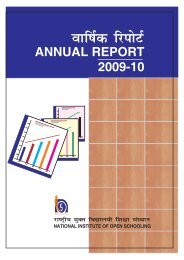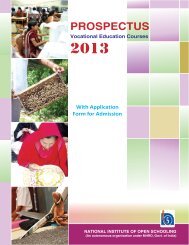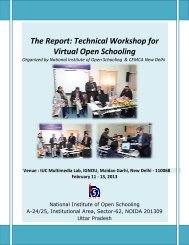Conference Report - The National Institute of Open Schooling
Conference Report - The National Institute of Open Schooling
Conference Report - The National Institute of Open Schooling
Create successful ePaper yourself
Turn your PDF publications into a flip-book with our unique Google optimized e-Paper software.
3. Quantitative Dimension:<br />
i. to set up 1500 more ITIs and 50,000 Skill<br />
Development Centers in PPP model<br />
ii. to set up 15 advance Training <strong>Institute</strong>s and 12<br />
Regional Vocational Training <strong>Institute</strong>s in PPP model<br />
iii. to run all ITIs and ITCs in 2-3 shifts to<br />
accommodate large number <strong>of</strong> trainees<br />
iv. to use ICT to reach out to remote areas<br />
4. Qualitative Dimension:<br />
i. Modernization <strong>of</strong> institutions<br />
ii.<br />
Modernization <strong>of</strong> tools, equipment and machinery<br />
iii. Training <strong>of</strong> trainers<br />
iv. ISO 29990 certification <strong>of</strong> ITIs and ITCs<br />
5. Improve relevance:<br />
i. Training-cum-placement cells in all ITIs/ITCs<br />
ii.<br />
Introduction <strong>of</strong> s<strong>of</strong>t skill in all courses <strong>of</strong>fered by<br />
ITIs<br />
6. Systematic reforms:<br />
i. Modernization <strong>of</strong> employment exchange<br />
ii.<br />
Setting up Sector Skill Councils (SSCs)<br />
iii. Web portal to be set up to provide virtual job market<br />
by linking prospective employers with the job<br />
seeking skilled candidates so as to match demand<br />
and supply<br />
iv. Development <strong>of</strong> a sound <strong>National</strong> Vocational<br />
Qualification Framework.<br />
<strong>The</strong> second presentation <strong>of</strong> this session was made by<br />
Mr. Guilherme Vaz, International Development Consultant.<br />
<strong>The</strong> topic <strong>of</strong> his presentation was: “From Prejudice to Pride<br />
– Policy Perspectives for Vocational Skills and Training<br />
to Empower Citizens”.<br />
He discussed the importance <strong>of</strong> knowledge, skills and<br />
innovation which are essential for a country to succeed.<br />
According to him, most <strong>of</strong> the developed nations are faced<br />
with skill shortages. At the moment this may be overcome<br />
with migration <strong>of</strong> labour but a national policy on vocational<br />
education and skill training synchronized with national policy<br />
and harmonized with international protocol for immigration<br />
governance needs to be put in place.<br />
Mr. Vaz addressing the house<br />
To get continued employment, the focus <strong>of</strong> our education<br />
should be on lifelong learning, to enable people to participate<br />
fully as an empowered citizen. While favoring<br />
Vocationalization <strong>of</strong> secondary school curriculum, he<br />
emphasized on the integration <strong>of</strong> academic and vocational<br />
education must be dealt with as a long-term education reform<br />
supported by business community, policy makers and<br />
planners.<br />
In the present day society, vocational skill and training can<br />
make a real difference to our lives by enhancing our abilities<br />
developing confidence in our capabilities. He cited the case<br />
study <strong>of</strong> Africa where Technical and Vocational Education<br />
and Training (TVET) received a fresh impetus from policy<br />
makers who recognized TVET as an effective means <strong>of</strong><br />
empowering young people to engage in productive and<br />
sustainable livelihoods.<br />
While highlighting various challenges that are being faced by<br />
India today, he stressed upon integration <strong>of</strong> competencies<br />
and skills in school curriculum, programmes and courses.<br />
He focused on the importance <strong>of</strong> PPP strategy in the<br />
education sector with reasonable control in the hands <strong>of</strong><br />
government. <strong>The</strong>re must be a reasonable regulatory and<br />
participatory framework including transparent accreditation<br />
guidelines to avoid uncontrolled mushrooming <strong>of</strong> educational<br />
institutions. Adequate attention must be paid to assessment,<br />
evaluation and certification <strong>of</strong> vocational courses. Recognition<br />
<strong>of</strong> prior learning and competency based assessment must<br />
receive due attention.<br />
9 // <strong>Conference</strong> <strong>Report</strong>


